
Last night I FINALLY watched Disney’s Frozen, making me the last person on Earth to see what the big deal was. With even less resemblance to Hans Christian Anderson’s The Snow Queen than 2010’s Tangled was to Rapunzel, but with twice the princesses to add to the franchise's line-up, it focuses on sisters Queen Elsa of Arendelle and her younger sibling Princess Anna.
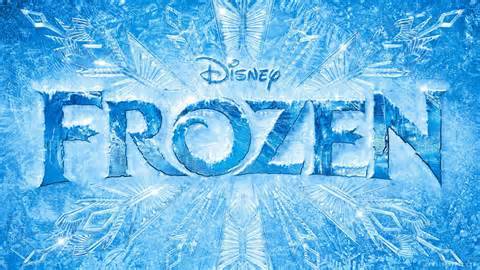
Born with cryokinetic powers (seriously, that’s a real word) that allow her to produce ice and snow from her fingertips, Elsa accidentally injures Anna as a child, leading her parents to seek help from the trolls. The king troll takes away Anna's memories of Elsa’s gift and tells Elsa that in the attempt to control her gifts: “fear will be your enemy.”
Naturally, this leads to her misguided parents (are there any other kind in fairy tales?) doing the exact opposite of what any reasonable person would do in this situation. They isolate Elsa, teach her to suppress her powers, and leave Anna in the dark as to why her sister now wants nothing to do with her. Heck, How It Should Have Ended sums it up perfectly:
Like Tangled, Frozen has a huge amount of setup to get through before it’s ready for the real meat of the story, which largely involves Anna’s attempt to reach her sister both physically and emotionally after Elsa’s powers spiral out of control during her coronation. In fear of hurting people she flees for the mountains – inadvertently leaving Arendelle caught up in an eternal winter.
Thanks to pop-culture osmosis, I already knew most of what followed: Anna teams up with a mountain man called Kristoff, Elsa sings Let It Go, there’s a talking snowman, Anna’s love interest Prince Hans turns out to be mercenary, and only an act of true love can thaw a frozen heart (which is nicely subverted not just in the sense that it’s sisterly and not romantic love that saves the day, but that the roles of the sisters are reversed in the fulfilling of it – Anna is the one that has to give rather than receive the act, and subsequently it's her heart that needs thawing, not Elsa's).
I knew about the controversies: the lack of diversity, the cultural appropriation of the Sami people, the similarities of the character designs to those of Tangled, the changes made from book to film, the apparent cameo of a gay couple, but I also knew about the positives: not one but two female leads, an emphasis on sisterly love over romantic love, and the apparent cameo of a gay couple.
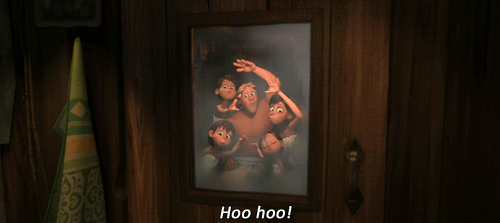
But since so much has already been said about this film and what everyone already knows about it, here’s a list of basic observations of things that I didn’t know going into it for the first time:
1) For a film that’s toted as the first Disney film to have two princesses as its leads, Elsa isn’t all that central. She's more what the film is about as opposed to its protagonist, a role that definitely belongs to Anna (kind of like how Sleeping Beauty was about Princess Aurora, but starred the three fairies).
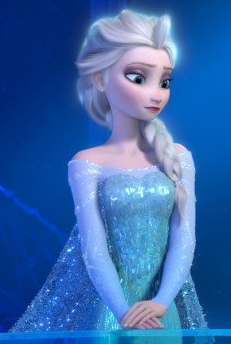
I’m pretty sure Kristoff clocks in more screen time than Elsa does, which is odd considering she’s (arguably) the most interesting character in the whole film. Her lack of focus surprised me considering I’d read all the metas about how Elsa’s life could be construed as a metaphor for mental illness and/or queerness, yet the film itself doesn’t afford her enough screen time to explore either interpretation with much depth.
2) The whole deal with Anna having her memories of Elsa’s powers erased when she was a child bothered me considering there’s never full disclosure later on in the story. This was probably one of the two most glaring flaws in the film, especially considering all the publicity that tries to sell the sisterly relationship as the focal point of the story.
The truth is that Anna spends most of her life completely bewildered and hurt as to why her older sister suddenly shuts her out of her life – and she’s still none the wiser (in regards to the specifics) by the ending.
The strangest thing is that there are plenty of times during Anna’s journey towards Elsa when it appears her lost memories are returning to her. When she meets Olaf, a reconstruction of the snowman the two girls made when they were children, Anna reacts with a definite “ping” when he introduces himself.
Olaf goes on to declare his love for Anna (“because I love you, I insist you run”) just as quickly as Hans does (the difference being that Olaf is sincere about it) and nearly melts in his attempt to start a fire for her (“some people are worth melting for”). More pertinently, at one point he directly echoes the words Anna spoke as a child: “the sky’s awake”, leaving me wondering if perhaps Elsa’s magic had made Olaf some sort of embodiment of the sisters’ childhood love for each other.
It seemed to be the perfect setup for Olaf to help Anna regain her memories of the accident and thereby gain a fuller understanding of Elsa’s fear and confusion. Except... that didn’t happen. Unless Elsa filled her in off-screen, Anna is still just as ignorant of the accident that started this whole mess at the end of the film. As such, I’m not certain why the removal of Anna’s memories was necessary for the story, or why her entire family chose to keep her in the dark about Elsa’s powers.
The story could have easily followed the same course with Anna’s memories intact, and probably would have given the girls’ relationship more resonance (as it is, Anna spends most of the film chasing the idea of a relationship with her sister that doesn’t really exist in the way she thinks it does).
3) The second biggest problem is the characterization of Prince Hans. After a whirlwind romance between him and Anna, the film ultimately casts him into the role of Secret Villain, revealing that he was after Anna’s kingdom and wealth the whole time.
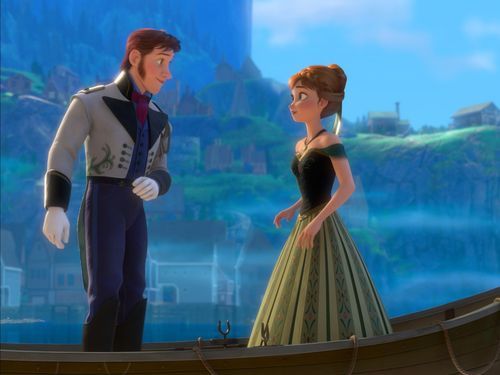
Well, okay. That’s not necessarily a bad idea in itself. Yet not only is there no foreshadowing for this (at least none that I noticed), but a huge amount of time and effort is put into building up the idea that he’s actually a decent guy (to the point where there are a couple of moments pre-reveal that show him acting like a decent person even when there’s no reason for him to keep up the façade).
Just as The Princess and the Frog deconstructed the notion that a person can simply wish on a star and have all their dreams come true, I liked the fact that Frozen poked fun at the Love at First Sight trope by having other characters points out how ridiculous it is when Hans and Anna announce their engagement on the same night they meet.
That they ultimately make Hans a villain feels like taking the easy way out, for the idea behind subverting Love at First Sight could have worked just as well if Hans had been exactly who he said he was, only for Anna to forge a much closer bond with Kristoff during the course of their adventure together, demonstrating just how shallow her romance with Hans was by comparison.
Naturally, her True Love’s Kiss with Hans would have failed since it was based on nothing more than hormones and superficiality, yet he could have still posed a threat to Elsa by misguidedly trying to kill her after the failure of his kiss with Anna, believing it to be the only way to save all of Arendelle (with the conveniently-placed Duke of Weselton on hand to spur him on).
4) I have no idea how true this is, but I read somewhere that Frozen’s songs were composed well before the script was completed – that in fact, Elsa was originally going to be the film’s villain before the writers heard Let It Go and reshaped the entire character based on its lyrics.
If that’s true, it certainly explains a lot about the film’s structure. Quite a lot of the plot seems to revolve around the songs, as opposed to the songs supplementing the story and characters. As such, the story has a rather piecemeal quality to it: all the separate parts are beautifully rendered and performed, but when put together it never quite merges into a cohesive whole.
For example, Love is an Open Door is a catchy song set to a fun sequence of visuals with plenty of great character beats that depict Anna/Hans falling in love in a way that feels very organic and sweet. If their love story was played entirely straight, I would have embraced the fairy tale logic and bought it. Heck, it would have felt totally justified after the film had already gone to such lengths to establish Anna’s profound loneliness.
Yet knowing that Hans had ulterior motives all along, I can’t help but feel in hindsight that too much time was spent on something that wasn’t all that important anyway. That extends to many of the other songs, such as Olaf dreaming about the summer (the lingering question of whether anyone is going to break the impossibility of this dream to him never amounts to much) or the match-making shenanigans of the trolls, which only seems to exist as a way of giving these guys a purpose that goes beyond exposition.
In short, every character, every idea, every subplot is given just enough screen-time to have an impact, but not enough to be explored to its full potential. Is the key relationship between Elsa and Anna or Anna and Kristoff? Is the antagonist Hans, the Duke of Weselton, or Elsa’s crippling fear of her powers? Is the point of the story to rescue Elsa from herself or to have Anna reach a greater understanding of what her sister needs? The film needed to pick one option and stick with it OR make sure that each one got its proper weight in the storyline.
5) Though Disney certainly played around with The Little Mermaid, it kept the general premise of the story (mermaid falls in love with man, gives up voice to sea witch in order to be with him). But as I said earlier, don’t expect anything in Frozen to even remotely resemble Hans Christian Anderson’s The Snow Queen. Besides some ice and a reindeer, I suppose.
Which is a shame since it’s a great story and would make for a stunningly beautiful film (though I think there's a pretty dire live-action Hallmark version starring Bridget Fonda out there somewhere).
There are a few little nods here and there to the source material: Prince Hans’s name seems to be a shout-out to Hans Christian Anderson, there are mentions of ice being lodged in a person’s head or heart (the story had a similar conceit in which shards of a glass mirror could become trapped in someone’s eye and/or heart), and I read somewhere that apparently Hans is meant to represent the mirror what with his ability to reflect other people's expectations whilst concealing his own darkness.
And if nothing else The Snow Queen would have made a much better title than Frozen, just as The Bear and the Bow would have been better than Brave. But hey, don't want to alienate the young male audience, right? Though they didn't seem to have a problem with The Little Mermaid (updated title: Wet) or Beauty and the Beast (updated title: Hairy) so are we meant to assume that boys have gotten more sexist since the Eighties/Nineties?
6) Okay, if it feels like I’ve been overly-critical with all this, it’s probably just because Frozen has been so hyped for so long that finally watching it was quite a surreal experience. I knew so much of what was coming (heck, I was reciting all the lyrics to Let It Go whilst Elsa sang them), that the little bits and pieces I didn’t know about felt like sprinkles on a cake: pleasant enough but hardly something to fully satisfy me.
But any successful film that has two women as its leads is a big step forward, and the animation throughout is (predictably) beautiful. One scene has Kristoff brushing through ice crystals that have formed on overhanging branches, which make a chiming sound as they move together. The scene serves no other purpose but to be beautiful.
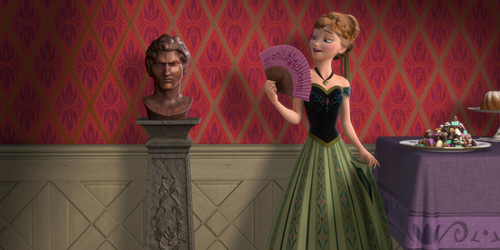
I loved the sequences of Anna engaging in conversation with the portraits and busts; such a simple and poignant way of conveying both her loneliness and optimism. I loved the back-and-forth between her and Kristoff (and will probably get in trouble for saying that I found their rapport more fun and natural than the sisterly bond).
I called that the chandelier in Elsa’s ice palace would plummet and nearly hit someone the instant I saw it crystalize, because that’s the only reason chandeliers exist in the movies. Olaf wasn’t nearly as irritating as I thought he’d be; in fact he got the biggest laugh out of me (his cheerful off-screen “hello!” to someone no more than a second after he’d assured Kristoff that he’d stay out of sight). And I would totally wear the dresses that are on display throughout the film - especially Anna's green one.
Ultimately, the feelings I have about Frozen lie in the two extremes of how it deals with its complexities. On the one hand the animators have boasted of rendering every individual snowflake depicted in the film as unique. On the other, the film’s climax posits that the years of Elsa’s isolation, depression and fear are wiped clean by her sister’s abounding love for her, leaving her completely in control and unashamed of the powers she’s spent most of her life trying to suppress.
In that sense, Frozen is a bit like one of its snowflakes: certainly very beautiful, but with an underlying emotional realism that melts in seconds.
No comments:
Post a Comment